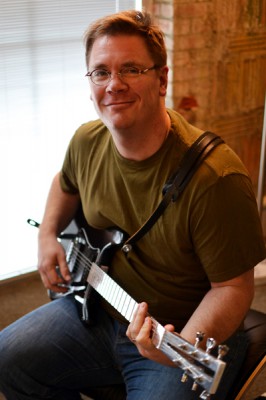You probably know someone living with sleep apnea. It could be your mom or dad, your brother or sister. You might even have this extremely common sleep disorder.
According to Paul Suratt, MD, a UVA sleep specialist, about 20 to 25 percent of men and 10 percent of women have this disorder.

I recently spoke with a UVA patient living with sleep apnea, Grahm Reynolds, to learn more about what it’s like to live with this disorder.
What is Sleep Apnea?
Sleep apnea is a condition characterized by multiple breath interruptions while you’re asleep, severely affecting your quality of sleep.
Apnea is a Greek word that literally means to deprive breath, and when this happens while you’re asleep, it makes waking up unsatisfactory and going about your day-to-day routine difficult.
Sleep apnea can be deadly. A sleep apnea sufferer may wake up gasping for air.
Reynolds, for instance, describes his state before being seen and treated at UVA as “drowning.” After “sleeping” for eight hours, he would wake up feeling as if he had slept for a fraction of that.
He describes living in a haze and feeling a sense of frustration over never being able to feel fully refreshed after sleeping. Even worse, Reynolds wasn’t sure if he really had a sleep disorder. It can be hard to know whether your sense of tiredness is connected to an actual, real sleep disorder or just being restless at night sometimes. Looking back at his 20’s, Reynolds can now clearly see he spent much of that time sleep deprived.
What’s a Sleep Study Like?
After moving to Charlottesville, one of Reynolds’ first appointments was with Lisa Martinez, MD, who recommended he enroll in a sleep study.
He described the sleep study experience as “electrode city.” There are a lot of wires and pads hooked up to a patient’s head and chest during a sleep study in order to monitor as many signs as possible. The whole process is painless, though.
After the first half of the study he was confirmed as having sleep apnea. In the second half of the night the doctor and technician had him sleep with a CPAP (continuous positive airway pressure) mask. The mask is relatively small and usually goes over your nose. It blows constant air through your nose to stop any tissue that would block the airway from collapsing. Your doctor sets the machine to have the perfect amount of air pressure to meet your sleeping needs.
A Healthier Rest
It was a pivotal point for Reynolds: “Finally joining the sleeping people.” It also pushed him to start living a healthier life. He started eating better and working out and has seen great results. Losing some weight allowed for the air pressure control on his CPAP to be lowered, making for an even more comfortable and restful sleep.
It’s a change in lifestyle. Your CPAP becomes your right-hand man. Reynolds did bring up that traveling can’t be as spontaneous as it used to be, but it’s definitely still an option. It just requires a bit of planning ahead.
Next Steps
If you have been having sleep issues, make sure to bring them up with your primary care doctor who, in the case of severe sleep problems, can refer you to a sleep specialist. Find a UVA primary care doctor.
UVA’s Sleep Disorders Center in Charlottesville has researchers and doctors who are able to diagnose and treat sleep apnea amongst many other sleep issues.

Thank you for sharing this. I feel like a large % of people take for granted positive sleeping habits, and they shouldn’t. I agree that adding healthier eating and exercise can really do wonders on your sleep habits. What eat plays a pivotal role on our bodies beyond how much weight we gain.
I always wake up in the mdidle of the night if I’ve been drinking the night before.Alcohol metabolizes into sugar, and a sugar rush in the mdidle of the night probably isn’t so good for sleep.
My son has sleep apnea. It was only diagnosed after he had a terrifying experience of falling asleep at the wheel of his car with his wife and three children in it. Pure luck made his wife suddenly to realize and wake him and a crash was averted. If in doubt get checked out. Pyps